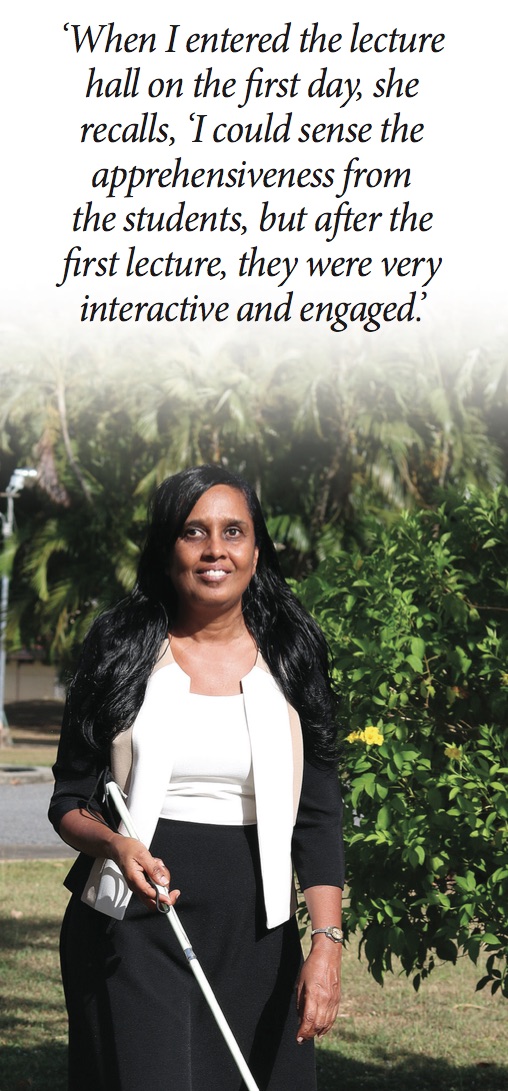Differently-abled scholar at the Faculty of Social Sciences uses adaptive technology to learn, teach, and challenge preconceptions
“This is my opportunity,” says Alicia Lalite, “to sensitise and positively influence the perceptions of future generations about persons with disabilities.”
Ms Lalite, a PhD candidate in Business Administration within the Department of Management Studies, was born with Retinitis Pigmentosa, a genetic and progressive eye disease that causes visual impairment and eventual blindness. She has encountered unique challenges on her path to academic success. They haven't stopped her.

As a PhD student at The UWI St Augustine specialising in Human Resource Management, Alicia has navigated the complexities of academia with conviction, drawing strength, she says, from mentors within the Faculty of Social Sciences (FSS) who recognise her potential. Her research focuses on the perceptions towards persons with disabilities in the workplace. She is nearing completion of her dissertation and doctoral studies.
“Alicia has been truly inspiring,” says Dr Shalini Ramdeo, a colleague within the PhD Business Administration programme. “Her ability to use adaptive technology to navigate the many academic complexities is a testament to her determination.”
Adaptive technology (AT), is a sub-category of assistive technology specially designed for persons who are differently-abled. They include screen readers, text-to-speech software, and other assistive technologies. AT has empowered Alicia in her studies and research. As a technology consultant and computer instructor in AT within the blind and visually-impaired community, she was able to capitalise on her expertise in this area.
“Alicia's presence in the classroom and her use of adaptive technology demonstrate the faculty’s commitment to being socially engaged and solutions oriented,” says Dr Acolla Lewis Cameron, Dean of the Faculty of Social Sciences.
Alicia's journey extends beyond the confines of a UWI student within FSS. Since 2014, she has been involved in the faculty’s summer programme, teaching Introduction to Management. Using AT, she engages students. At the beginning of the semester, Alicia would brief the students on her abilities, and give them alternative approaches to encourage their participation.
“When I entered the lecture hall on the first day,” she recalls, “I could sense the apprehensiveness from the students, but after the first lecture, they were very interactive and engaged.”
In the first semester of the 2022/2023 academic year, Alicia transitioned to co-lecturing, teaching over 150 students under the supervision of Dr Riann Singh, Senior Lecturer and Deputy Dean of Graduate Studies and Research at FSS, and Head of the Department of Management Studies Dr ShellyAnne Wilson.
Dr Singh says, “From a supervisory perspective and, based on student assessments, the feedback has been positive, attesting to Alicia’s ability to effectively use adaptive technology in the classroom. She was offered another opportunity this semester [Semester 2, 2023/2024] and is progressing well thus far in co-lecturing.”
She adds, “As a faculty, we are proud.”
For Alicia, teaching is not merely a profession but a calling - one that enables her to inspire the next generation of scholars and leaders.
“I was delighted when given the opportunity to co-lecture. This was the moment I have been waiting for,” she says.
“From a human resource (HR) perspective, the policies for recruiters, employers, and employees, as well as learning institutions, lack inclusivity,” she continues. “They are apprehensive to practise full inclusion of persons with disabilities. I was able to sensitise students on the capabilities of persons with disabilities. They learn that having a disability does not prevent me from lecturing. This challenges their preconceptions about the differently abled.”
She further credits her success in the classroom to the support of the administrative and technical staff within the faculty and the Teaching and Learning Complex at the university, who assist with guiding her to the lecture rooms and providing the necessary technical support for the additional equipment.
That support helps her with challenges like navigating classes with smaller physical spaces and larger cohorts of students, overcoming obstacles that illustrate her resilience, her colleagues within FSS say.
Her students, she believes, have also been inspired.
“When they approach me at the end of the semester or share emails expressing their gratitude, not only for the course insights shared but expanding their perspective on how they view persons who are differently abled, I am indeed humbled,” she says.
Speaking on the importance of providing opportunities to talented scholars such as Alicia that are differently abled, Dr Singh says, “Within academia, diversity and technology are not mere buzzwords, but essential components of progress. Alicia Lalite’s journey serves as a reminder of the transformative power of inclusivity and adaptive technology. As her accomplishments are celebrated, it reaffirms the Faculty of Social Sciences' commitment to creating an inclusive educational landscape—one where every student can thrive and excel.”
She adds, “In the pursuit of knowledge, barriers are meant to be overcome. By moving beyond embracing diversity towards inclusivity, capitalising on AT, and paving the way for a brighter, more inclusive future in education, we are moving in the right direction.”